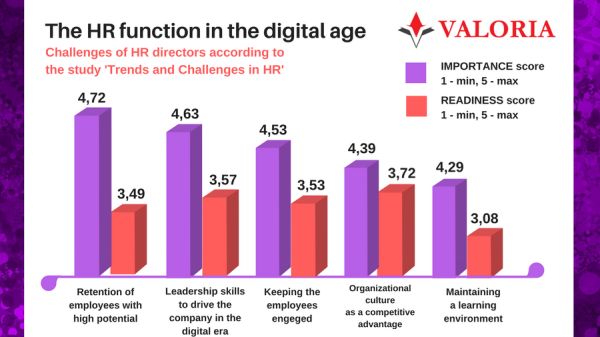Even if some companies announce that they are changing their technology, the role and processes of HR remain unevolved, while other companies simply write history by integrating these elements and operating on the basis of the new digital paradigm in HR.
The survey Trends and Challenges in HR conducted by the consulting company Valoria gauges the perceptions of top executives panies and HR directors on the strategic challenges facing HR. The questionnaire, which received 207 responses, was applied at the end of 2017. The responses show major discrepancies between companies about the strategic and systematic contribution of HR in business development.
Strategic challenges in HR
According to Valoria's research, the five key strategic challenges in the HR area on the top executives’ agenda (on a scale of 1 - not important to 5 - very important) are as follows:
- Retention of high-potential and high-performing employees - 4.60 in 2017 vs. 4.39 in 2016
- Maintaining a high level of employee engagement - score 4.53 in 2017 vs. 4.49 in 2016
- Ensure leadership skills to help the organization respond to new business requirements and the rapid pace of change - 4.35 in 2017 vs. 4.28 in 2016
- Creating an organizational culture (values, beliefs, behaviors) that give a competitive edge to the company - score 4.20 in 2017 vs. 4.17 in 2016
- Create and maintain a learning environment that responds rapidly to the development needs of employees, using technology - 4.18 in 2017 vs. 4.02 in 2016
Other strategic challenges on the organization's HR agenda: lack of competent and motivated graduates (67% of respondents), lack of specialists and craftsmen (61%), frequent need to adapt to inconsistent legislative changes (54%), lack of direct involvement of employees in personal development (36%) and shorter working periods for an employer (34%).
General Directors vs. HR Directors
Looking at these results according to the role of the respondent's company, we find that there are differences between the answers given by the CEOs and the company's senior executives and HR directors / managers regarding the three most important strategic challenges in the HR area.
For CEOs and business executives, the top 3 HR challenges are:
• Creating and maintaining a learning environment that responds rapidly to the development needs of employees, including through the use of technology - score 4.68
• Retention of high-potential and high performance employees - score 4.53
• Ensure leadership skills to help the organization respond to new business requirements and the rapid pace of change - score 4.46
For HR managers / managers, the top 3 strategic challenges in the HR area are:
• Retention of high-potential and high-performing employees - score 4.72
• Ensure leadership to help the organization respond to new business requirements and the rapid pace of change - 4.63
• Maintaining a high engagement of employees - score 4.53
Automation of the HR function
In 2017, 5 out of 10 respondents say they have a solution for automating HR processes, 34% say they do not want to implement, and 15% say they have no plans to implement one. Of the responding companies, 47% believe that the use of HR technology is of increased importance for measuring the performance of the department, 28% are undecided or believe it is only somewhat important, and 19% consider it a key critically important element.
The results of the study also show that the most important trends that can significantly change the HR function in the future are: mobile and social media applications (47% of companies), artificial intelligence (43%), political and economic developments (43%) and demographic change (42%).
In conclusion
Companies that understand the transformation they need to undertake in the digital era have a clear destination, strategy and action plan to get there. The tansformation plan should also include actions to create a new mentality in the HR function so that it can support the accelerated change in the digital age and how fast-moving technology dramatically rewrites the rules for future success. Thus redefining the HR function and its value for the company should be done by using the technology and skills that capitalize on the huge input of predictive data analysis.

































